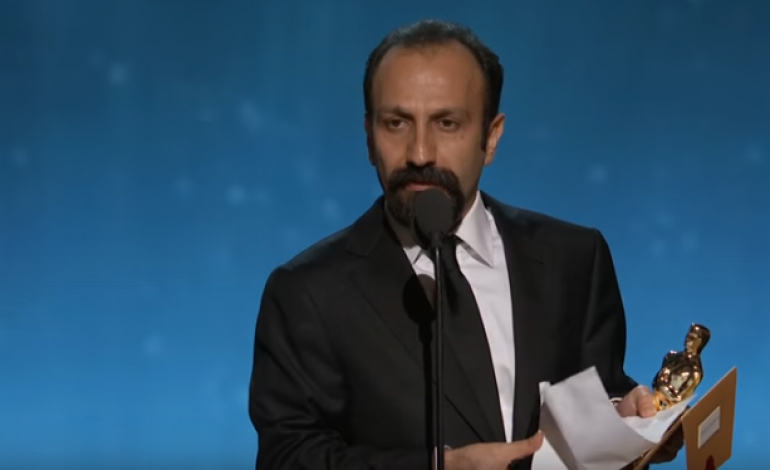

In the aftermath of last Friday’s executive order signed by President Donald Trump – which bans travel from seven predominately Muslin nations – Iranian filmmaker Asghar Farhadi, whose The Salesman is currently nominated for the Best Foreign-Language film Oscar, has confirmed he will not be attending the Academy Awards. In the immediate wake of the executive order, reports surfaced that it may not be feasible for Farhadi to attend the ceremony – which takes place in Los Angeles on February 26th. On Sunday, Farhadi confirmed that even if an exception could be granted to him, he will not attend. In a statement to The New York Times, Farhadi stated that he had never had the intention to boycott the ceremony and hoped, for his part, call attention to what he felt an “unjust” decision on the part of the President.
Taraneh Alidoosti, the female lead of The Salesman, took a different tactic and expressed that she would indeed be boycotting the Oscar ceremony. Alidoosti took to social media and stated, “Trump’s visa ban for Iranians and others is a racist move and unacceptable.” This action was taken following drafts of the executive order were leaked to the media and as well as ahead of Farhadi’s announcement.
Trump’s visa ban for Iranians is racist. Whether this will include a cultural event or not,I won’t attend the #AcademyAwards 2017 in protest pic.twitter.com/CW3EF6mupo
— Taraneh Alidoosti (@t_alidoosti) January 26, 2017
On Saturday, a spokesman for the Academy of Motion Picture Arts and Sciences issued a statement in regards to the ban and directly acknowledged Farhadi:
The Academy celebrates achievement in the art of filmmaking, which seeks to transcend borders and speak to audiences around the world, regardless of national, ethnic, or religious differences,” the statement said. “As supporters of filmmakers — and the human rights of all people — around the globe, we find it extremely troubling that Asghar Farhadi, the director of the Oscar-winning film from Iran A Separation, along with the cast and crew of this year’s Oscar-nominated film The Salesman, could be barred from entering the country because of their religion or country of origin.”
Farhadi’s full statement below:
I regret to announce via this statement that I have decided to not attend the Academy Awards Ceremony alongside my fellow members of the cinematic community.
Over the course of the past few days and despite the unjust circumstances which have risen for the immigrants and travelers of several countries to the United States, my decision had remained the same: to attend this ceremony and to express my opinions about these circumstances in the press surrounding the event. I neither had the intention to not attend nor did I want to boycott the event as a show of objection, for I know that many in the American film industry and the Academy of Motion Picture Arts and Sciences are opposed to the fanaticism and extremism which are today taking place more than ever. Just as I had stated to my distributor in the United States on the day the nominees were announced, that I would be attending this ceremony along with my cinematographer, I continued to believe that I would be present at this great cultural event.
However, it now seems that the possibility of this presence is being accompanied by ifs and buts which are in no way acceptable to me even if exceptions were to be made for my trip. I would therefore like to convey via this statement what I would have expressed to the press were I to travel to the United States. Hard-liners, despite their nationalities, political arguments and wars, regard and understand the world in very much the same way. In order to understand the world, they have no choice but to regard it via an “us and them” mentality, which they use to create a fearful image of “them” and inflict fear in the people of their own countries.
This is not just limited to the United States; in my country hardliners are the same. For years on both sides of the ocean, groups of hardliners have tried to present to their people unrealistic and fearful images of various nations and cultures in order to turn their differences into disagreements, their disagreements into enmities and their enmities into fears. Instilling fear in the people is an important tool used to justify extremist and fanatic behavior by narrow-minded individuals.
However, I believe that the similarities among the human beings on this earth and its various lands, and among its cultures and its faiths, far outweigh their differences. I believe that the root cause of many of the hostilities among nations in the world today must be searched for in their reciprocal humiliation carried out in its past and no doubt the current humiliation of other nations are the seeds of tomorrow’s hostilities. To humiliate one nation with the pretext of guarding the security of another is not a new phenomenon in history and has always laid the groundwork for the creation of future divide and enmity. I hereby express my condemnation of the unjust conditions forced upon some of my compatriots and the citizens of the other six countries trying to legally enter the United States of America and hope that the current situation will not give rise to further divide between nations.
Farhadi is an internationally celebrated filmmaker whose most acclaimed work is the 2011 feature A Separation, a film that earned the Academy Award for Best Foreign-Language Film as well as a second nomination for Farhadi’s original screenplay; he also directed About Elly (2009) and The Past (2013). The Salesman, for which Farhadi earned the Best Screenplay prize at the 2016 Cannes Film Festival (where the film made its world premiere), revolves around a couple whose relationship starts to turn sour as they portray the leads in a theatrical production of Arthur Miller’s classic play Death of a Salesman. Shahab Hosseini, the male lead in the film, also took home a prize at this past year’s Cannes Film Festival.

